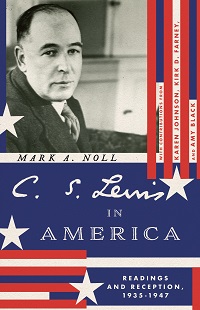 C.S. Lewis in America: Readings and Reception, 1935–1947, by Mark A. Noll, Professor of History Emeritus, Wheaton College.
C.S. Lewis in America: Readings and Reception, 1935–1947, by Mark A. Noll, Professor of History Emeritus, Wheaton College.
Perhaps no other literary figure has transformed the American religious landscape in recent history as much as C.S. Lewis. Even before the international publication and incredible success of his fictional works such as The Chronicles of Narnia or apologetic works like Mere Christianity, Lewis was already being read "across the pond" in America. But who exactly was reading his work? And how was he received?
With fresh research and shrewd analysis, this volume by noted historian Mark A. Noll considers the surprising reception of Lewis among Roman Catholic, mainline Protestant, and evangelical readers to see how early readings of the Oxford don shaped his later influence.
C.S. Lewis in America is part of the Hansen Lectureship series which offers accessible and insightful reflections by Wheaton College faculty members based upon the transformative work of the Wade Center authors. The Wade Center is grateful for our partnership with IVP Academic and the many ways that the Hansen series broadens the scope of the conversation about these authors and their work.
C.S. Lewis in America is available for purchase at the Wade Center and online from IVP Academic.
Praise for C.S. Lewis in America:
"From elite, secular newspapers to denominational magazines, C.S. Lewis's writings commending the Christian faith had an enthusiastic reception in America. In this prophetic and timely book, preeminent historian Mark A. Noll has uncovered the secret of Lewis's success: he was deeply learned, theologically focused, and unusually creative. Noll himself brilliantly models how to embody these traits today."
- Timothy Larsen, McManis Professor of Christian Thought at Wheaton College and author of George MacDonald in the Age of Miracles
"This is a deeply informed, fascinating account of the varying fortunes of C.S. Lewis's writings in America. Initial misunderstanding and mistrust give way to respect, and then to reverence, and ultimately to something not far from idolatry. Noll tells the tale vividly, and the responses from Johnson, Farney, and Black point out some vital implications of this history for Christians today. A welcome addition both to Lewis scholarship and contemporary Christian self-reflection."
- Alan Jacobs, distinguished professor of humanities at the Honors College, Baylor University
"Mark Noll's C.S. Lewis in America gives evidence to the principle that the academic enterprise consists in seeing patterns and exceptions. Without generalizing, no body of knowledge can be passed on to others. And without accounting for exceptions, no generalization is honest. Noll has mastered the art of abstraction. With faithful respect for the particulars, he writes as Georges Seurat painted—he applies each researched point, after point, to the canvas of his manuscript. What emerges is a masterpiece, unambiguous. The picture is clear. Noll convinces. All who read this book will understand, with good reason, the American fascination with C.S. Lewis."
- Jerry Root, author of Splendour in the Dark: C.S. Lewis's Dymer in His Life and Work and professor emeritus at Wheaton College
"Mark Noll offers the definitive account of Lewis's reception in mid-twentieth-century America. He skillfully uses that story as a window on the overall state of Christianity in America during an era."
- George Marsden, professor emeritus at the University of Notre Dame and author of C.S. Lewis's Mere Christianity: A Biography
"Interesting and informative. Mark Noll sheds light on the various ways American readers received Lewis's early works and, in so doing, illuminates the state of Christianity throughout the United States more generally during the period under examination. A fascinating snapshot and a cleverly oblique approach to the study of church history."
- Michael Ward, University of Oxford, author of After Humanity: A Guide to C.S. Lewis's The Abolition of Man
-
Connect with the Wade Center
-
By Mail:
Marion E. Wade Center, Wheaton College, 501 College Ave., Wheaton, IL 60187
See "Plan Your Visit" page for street address -
630.752.5908
wade@wheaton.edu - Instagram Facebook Youtube
